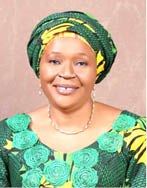Chinwe Anunobi is the CEO of National Library of Nigeria. She spoke to journalists on the journey so far as the library turned 60 years old on November 4th. She spoke on the challenges, feats and other issues as they prepare to celebrate the milestone in a few days.
The National Library is 60; what is the story so far?
The National Library has been there. It was 57 years before I came. They have done so much. They moved from Lagos to Abuja and when they moved, it has been living up to the mandate that was captured by Carl Seitz in the 60s, that is the mandate that is still being upheld and it remains correct and relevant. It doesn’t change because the mandate of the National Library is the same for all national libraries in the world.
The library has been preserving the nation’s heritage and that is why we are able to count 5.5 million of resources collected from that time till now and we have 14 millions of volumes collected from inception, that is as heritage.
- 2 die in Imo bomb explosion – Police
- ‘Trade agreements with African countries will benefit Nigerians’
The second part of it is that, it’s not only collecting and preserving; you should make people read these things and the National Library since the beginning, when it had the first readership promotion, it has been living up to its mandate; that mandate of promoting reading, collecting and preserving it for posterity.
So far, have you been able to achieve the agenda you set when you assumed office 3yrs ago?
When I came, I saw that they were making some effort but I wanted to take it further because the National Library is not only about the elites and that’s why I took it to the hinterland.
I want to let you understand that the National Library has been living up to its mandate because it’s a bibliographic centre. We cannot just allow Nigerian publishers to just publish anything; we really need to give them standards and that is why international standards place the assigning of international numbers in the National Library.
We advocate and sensitise authors on how they are going to write the pages, format and styles in writing and then we assign them numbers. So, they have been doing it and we have a lot of justifying evidence of what they are doing.
Currently, we have 35 branches, that’s including Abuja. We are operating very enormously and that is to tell you that it’s not only that we are providing those branches, but the National Library is now providing a public space. The public space means that it’s not only for people to walk in to read, because the branches are public outlets.
We do some other things in the space like leveraging the technology, encouraging technology training, capacity, development in diverse ways and entrepreneurship, depending on the capacity and environment where the branches are.
How were you able to preserve the resources available to you all the years?
When I came, we had enormous resources, and it spans from beyond independence, because the British Council gave some resources when they were leaving us, very important documents of this country to the National Library. So, many of these resources, newspapers published in the past, in the early 60s, are threatened and the country is losing its heritage. So, that made me present my roadmap that will guide my administration to make sure that I’m able to achieve, make a mark, based on the strategic plan and the vision and mission of the National Library.
I primarily have digitisation, because there is no way you can save these resources if not to digitise them. So, we zeroed into digitisation. We have recovered some and not only that we are digitising to preserve; we are also digitising to provide access because the manner and approach to information sourcing and information packaging have changed. People are no longer interested in always going to the library.
When you go to our own library where we have our own resources, they look deteriorated. I wouldn’t call it death-eating, naturally deteriorated. So, the only way to save them and also provide access is to digitise them and we have started digitising, preserving, and then creating access using the platform we developed; the National Repository of Nigeria and then, automating all our operations because that’s one way of doing it fast, getting it right, and also providing easy services.
What is the usage of the National Library like?
Those who use our library attested that this National Library has helped from that time till now. We have had seven millions of unique users. We are taking our records and we have had 34 millions of footprints. If you visit the National Library, that’s a unique user but footprints are those who come to use the library for one thing or another, including the unique users.
And we have given a large number of international standard book numbers. Since we started giving out the numbers, that was when this National Library was made a bibliographic centre. We have given 1005 of international serial standard numbers. We have given 27,000 international serial numbers.
What are the challenges the National Library faced and is still facing?
Definitely, the downs are more than the ups. We have been able to struggle to do great things but that means a lot of challenges.
I wasn’t here when the National Library moved from Lagos to Abuja but you can imagine what it looked like.
It’s not like they’re moving just seats or moving files, but they are moving structures, shelves, millions of books, millions of newspapers from the 1960s and it wasn’t easy for them. So, that was the greatest challenge, according to the National Library chief executive that moved it.
And then, coming in here, the challenges became so enormous because in other countries, they pride their libraries, the National Library is a heritage that every country should be proud of and that is why they got the land in the central area, but then, maybe subsequently, the value attached to it by our leaders depreciated; they didn’t understand the importance.
They are looking at the National Library as just a library. The National Library is different from other libraries. This is what the country has not been able to do. The National Library is a heritage site. It’s a monument. In other countries, you go there and you see. You can read in the National Library pictorial or any other thing. You can read the president, the development of the country, from the inception till the present, where you are. And also, whatever you cannot find anywhere, you find it in the National Library and that’s the essence of the monument.
So, this structure, that is accommodation, became one of the greatest challenges we have in this organisation, followed by funding and inadequate staff. I can tell you that it’s only 619 staff members that are working in the entire National Library in the country.
The former Chief Executive, before he left, said you are operating under obsolete laws, is there any plan to review those laws, especially the penalties?
Yes, when I assumed duty, I took it upon myself to get it done. They have reviewed internally and the board has looked at it.
And we had to get to the minister and it’s a process; it was sent to the president for assent but the time elapsed. The president could not assent to it, so it was sent back to the National Assembly.
And that’s where we are. It has not been easy for us. The country is grappling with a lot of challenges, and I think the National Assembly, when you bring that kind of thing, they will keep it in abeyance because they wouldn’t know the import.
What is the state of the National Library building?
The need we have for it in 2006 is more urgent now than then because we have increased in number, our resources have increased with the need for us to do better services as we are moving into a digital world.
There is a need for us to train, have a data centre and that National Library is big enough to be a data centre for this country. You set a data centre either in the basement or in the penthouse for the whole country.
The building is not ready and we are managing. The thing is restricting everything we are doing and our operations, services and the image.
It’s not even restricting; it is embarrassing the country. It’s not only about us; it is about the nation.

 Join Daily Trust WhatsApp Community For Quick Access To News and Happenings Around You.
Join Daily Trust WhatsApp Community For Quick Access To News and Happenings Around You.


